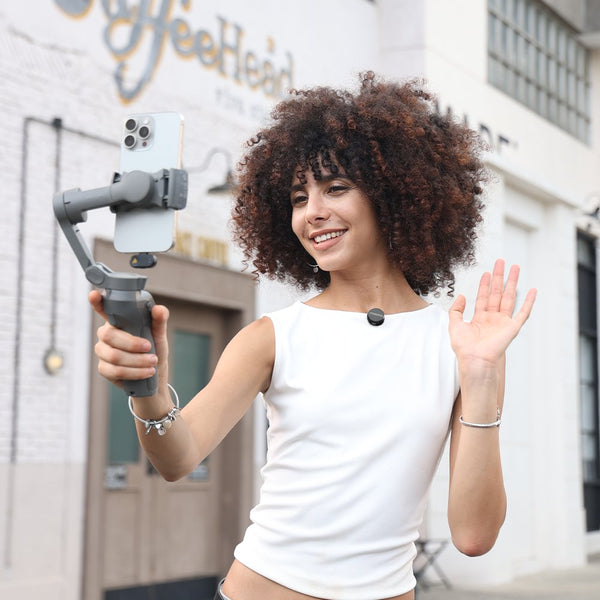Booking a great guest is something your audience will want to listen to. When combined with a compelling topic, an eye-catching cover photo, and excellent sound quality, these elements are the ingredients for podcast success. Using a studio microphone or a noise cancelling microphone ensures your episodes sound crisp and clear—a key to keeping listeners engaged.
Podcasting has grown into a powerful platform for sharing ideas, building communities, and establishing authority in any niche. One of the most effective ways to keep your podcast engaging and dynamic is by inviting guests. But how do you find the right guests, reach out to them, and ensure the audio sounds professional? This article covers all of that—and highlights the best podcast microphone gear to make your interviews sound pro.

What Are the Benefits of Inviting a Guest to Your Podcast?
Bringing guests onto your podcast adds fresh perspectives, increases credibility, and helps grow your audience through shared networks. A guest can bring expertise, diversity of thought, or simply a new story your audience hasn't heard before. Many podcasters experience listener growth after featuring well-known or well-matched guests, especially when those guests promote the episode on their own platforms.
How Do I Contact a Guest for a Podcast?
Contacting a guest begins with identifying individuals who align with your podcast’s topic and tone. You don’t need a massive following to invite someone—what matters is the value you offer and how you frame your invitation. Email is the most professional method, but social media DMs or LinkedIn messages can also be effective when crafted thoughtfully.
Why Podcast Mic Quality Matters
Nothing ruins a great interview faster than poor audio. Whether it's muffled voices, distracting background noise, or uneven volume levels, bad audio makes listeners click away. A high-quality podcasting microphone ensures that both you and your guest sound polished and professional. It conveys credibility and makes your content more enjoyable. Investing in the right microphone setup for podcasting is a step every serious podcaster should take.
How Do I Get a Guest Spot on My Podcast?
Start by clearly defining your show’s purpose and audience. This helps you filter which potential guests are a good fit. You can:
-
Reach out to professionals in your niche.
-
Network through industry events or forums.
-
Invite friends or colleagues with interesting experiences.
Be transparent about the format, time commitment, and what the guest can gain—such as exposure or backlinking opportunities.
How Do I Get People to Find My Podcast?
To attract potential guests (and more listeners), ensure your podcast is discoverable. Promote on social media, use keyword-rich episode titles, submit to directories like Apple Podcasts and Spotify, and consider guesting on other shows yourself. The more visibility you have, the more appealing your podcast becomes to potential guests.
How to Find Podcast Clients?
If your podcast services or sells something—like coaching or consulting—inviting aligned guests is a subtle but effective form of content marketing. By showcasing relevant discussions and industry knowledge, you attract clients who relate to your content. Use calls to action and include links in show notes to convert listeners into clients.
How Do I Reach Out to Potential Guests If I Don’t Know Them Personally?
Cold outreach is common in podcasting. When reaching out, keep your message concise and respectful. Here’s what to include:
-
Who you are
-
What your podcast is about
-
Why you're inviting them
-
What they’ll gain from the appearance (e.g., exposure, backlinks, access to your audience)
-
Time required and format details
Personalize your message—mention something they’ve done that you appreciate to show you’ve done your homework.
Can I Use LinkedIn, Twitter, or Instagram to Find Podcast Guests Effectively?
Absolutely. Social media is one of the best tools for guest outreach:
-
LinkedIn is great for professionals and thought leaders.
-
Twitter helps you find industry influencers through hashtags and conversations.
-
Instagram can connect you with creatives, authors, and lifestyle personalities.
Engage with their content first, then follow up with a DM or message showing genuine interest.
What Should I Include in a Guest Invitation or Email Pitch?
A good email pitch is clear, flattering (but authentic), and actionable. Include:
-
A brief intro about you and your podcast
-
Why you think they’re a great fit
-
A few recent guests or topics to build credibility
-
How the process works (recording time, format, platforms)
-
Any stats that add value (download numbers, listener demographics)
-
A clear call to action (e.g., “Would you be open to joining us for a 30-minute chat?”)
How Do I Find Guests That Align With My Podcast Theme or Audience?
Define your target audience clearly—age, interests, industry, goals. Then look for guests who can speak directly to that group. Tools like Podmatch, MatchMaker.fm, or even niche Facebook Groups are great for finding aligned guests.
Consider using a spreadsheet to track potential guests, their niche, contact method, and whether you’ve reached out. This keeps your outreach organized and strategic.
Should I Consider Influencers, Authors, or Experts—Even if They're Not in My Direct Niche?
Yes, absolutely. Some of the most compelling episodes happen when you bring in outside perspectives. For example, an author writing about resilience could add value to a business podcast. Or an influencer in health might resonate with your productivity-focused audience. Always focus on the value they offer to your listeners.
Are There Websites or Platforms Where Guests and Podcasters Connect?
Yes. Several platforms are designed to connect podcast hosts with potential guests:
-
PodMatch
A matchmaking tool for hosts and guests.
-
MatchMaker.fm
Similar to a dating site for podcasting.
-
Podchaser
A podcast directory with guest profiles.
-
Podcast Guests
Offers a free newsletter and guest directory.
These platforms allow you to browse bios, topics, and even set up interviews within the app.
FAQs on Podcast Microphone:
What Mic Features Matter Most for Podcast Interviews?
The essential features for any podcast microphone setup include:
-
Cardioid polar pattern (sound capture focuses on the voice and reduces unwanted background sound)
-
Low self-noise and high sensitivity
-
USB/XLR versatility depending on your setup
-
Built-in gain control or mute buttons
-
Pop filter or windscreen for reducing plosives
Good audio quality sets you apart from the 20 million other podcasts online. If you're doing interviews remotely, ensure your guest also has access to a decent mic—or be ready to coach them on improving their setup. Using a noise cancelling microphone is especially useful for remote recordings or busy environments. It ensures the focus stays on your voice—not on background sounds.
How Do I Make Sure Both Me and My Guest Sound Professional During the Recording?
Use a reliable studio microphone, position it about 6–8 inches from your mouth, and record in a quiet, echo-free room. Ask your guest to do the same. If they don’t have a mic, encourage them to use wired earbuds or send a budget mic ahead of time if it’s a high-value interview.
Also:
-
Do a quick test recording.
-
Use recording software that supports multitrack recording (e.g., Riverside, Zencastr, or Zoom with local backups).
-
Use post-production tools like noise reduction and EQ to balance levels.
Are There Budget-Friendly Podcast Mics That Still Sound Professional?
Yes. Two excellent choices are:
-
Type: Dynamic microphone
-
Connection: USB and XLR
-
Features: Adjustable mic gain knob, one tap to mute button, headphone jack
-
Why it’s great: The Maono PD400X is versatile, with excellent background noise rejection—perfect for interviews in less-than-ideal environments. It’s one of the best podcasting microphone options under $150.
Maono PD300X
-
Type: Dynamic microphone
-
Connection: USB/XLR
-
Features: Real-time monitoring, intuitive controls, 5-level noise reduction
-
Why it’s great: Maono PD300X is an affordable, plug-and-play setup ideal for beginners or remote guest kits.
Both are top-tier choices for anyone refining their microphone setup for podcasting without going over budget.
If you wish to buy a high-quality 2-person podcast equipment bundle great deals await you in Maono, sign up now if you’re new and get a 10 percent discount.

Conclusion
Finding the right podcast guest is about more than just filling time—it’s about enhancing your content, growing your reach, and providing value to your audience. With a thoughtful outreach strategy, smart use of social media, and the right tools like PodMatch or MatchMaker.fm, your guest list will grow naturally over time.
But great guests are only part of the formula. Professional-sounding audio is what keeps listeners tuned in. Investing in a quality podcasting microphone like the Maono PD400X or PD300X ensures your show sounds as good as it is informative. Together, solid guests and clean audio create a podcast people trust, share, and return to week after week.
Ready to elevate your podcast? Start inviting the right voices—and make sure every word is heard loud and clear with the right podcast microphone setup.



